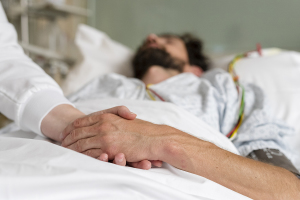It's time to take your mental health seriously
On July 8, the 23-year-old, four-time Grand Slam Winner Naomi Osaka had an essay published in Time magazine: It’s O.K. Not To Be O.K. It’s her explanation as to why she took time away from the French Open. What was her reasoning?
Mental health.

America has been having an unprecedented problem with mental health. From gender dysphoria to anxiety, from depression to eating disorders, it’s never been this bad across the nation and it’s not getting any better. With the regular stresses and struggles of everyday life, one’s mental health normally goes through ups and downs and various cycles. But the COVID-19 pandemic and the intense political climate of the 2020 Election have pushed the nation’s mental health meter into extreme red.
Being a person who battled addiction for seven years, I would argue that mental health is as equally as important, if not more important, than physical health. Exposure to emotions like stress and anxiety cause a person to create an internal environment of cortisol, adrenaline, and other hormones, which negatively impact the brain and the rest of the body. But how do we fix these problems?
Step one: understand the numbers
The first step to solving any problem is discovering and acknowledging that there is a problem. A fire cannot be put out unless smoke or fire is seen, and 911 is contacted. When you look at the numbers, the fire is raging.
According to Mental Health America, about 10% of American youth have severe major depression. Thoughts of suicide increased in adults by 460,000 in the span of a year! And don’t blame COVID-19 for these numbers. In 2017-18, almost a fifth (19%) of adults experienced some kind of mental illness, which is a 1.5 million jump from the previous year. The CDC reported that in a span of 6 months (August 2020-February 2021), the percentage of adults with symptoms of anxiety or a depressive disorder rose by 5.1%.
We know that a global pandemic of a highly infectious disease is highly stressful and contributes to mental health problems. Add in an overwhelming volume of unending media coverage about the pandemic and you have a concoction for fear, headaches, and insomnia. Add to that lockdowns across America, which isolate people from their classmates, co-workers, neighbors, friends and families, and you have the perfect emotional storm.
The pandemic also cut off opportunities for people to escape to the movies, beaches, amusement parks, gyms, and other places used for mental and physical decompression. For the finishing touch, the “experts” made people afraid of each other by enacting social-distancing policies, mask mandates, and producing an obsession when it comes to cleanliness. The 2020 Election was the cherry on top. All of this was like dropping a nuke of mental illness on the nation.
Substance abuse was simultaneously a cause and effect in this epidemic. According to the American Medical Association, more than 40 states saw an increase in opioid-related mortality. In 2020, San Francisco actually had a bigger fentanyl problem than COVID problem; the number of deaths from the deadly drug was almost three times that of COVID deaths. The Washington Post reported Washington D.C. had a major problem with opioids, seeing a record number of deaths. 37 of 38 U.S. jurisdictions reported an increase in synthetic opioid-involved overdose deaths and 18 of those jurisdictions saw their increase was greater than 50%.
The nation crippled itself and paid a heavy price, all for a disease with a survival rate of 99.32%. We shut down the country, the economy, the lives of adults, the lives of children, our development, and our success. When all is said and done, one might argue that the damage to our nation’s psyche may have equaled or exceeded the terrible toll in health.
Step two: Accept that everyone is going through something mentally
After discovering the numbers and acknowledging that the issue is as grim as it is widespread, the second step is getting people to accept Osaka’s position: It’s okay to not be okay. All people should address their level of mental health and not be afraid to say that something is wrong. Life throws highs and lows, triumphs and tragedies, good times and bad times. During all stages, your mental health is evolving. And just because someone looks fine on the outside, doesn’t mean that internally they aren’t fighting a crisis.
There is a famous story of General George Patton from World War II. In 1943, he slapped a soldier, accusing him of cowardice after not seeing any visible injuries. The soldier, Pvt. Charles H. Kuhl, didn't have any external injuries, but he suffered internally in his mind. He was shell shocked. Kuhl told Patton something was wrong, but Patton didn’t listen. To be fair to the general, mental health wasn’t well understood back then, but we understand the lesson from this story.
Social media has exacerbated the problem. As I mentioned in my op-ed last month, there is the real world and the virtual world. On social media, people usually only show the good in their lives. The delicious plates of food. The vacations. Photos of them kissing their significant others. New cars. New homes. But what must be remembered is that what is on social media is carefully curated.
This is a fact of life online and offline: People show what they want others to see.
Remember the influencer that you love and follow is probably having troubles, too. We’ve seen the deaths of countless stars who on the outside appear to have it all, but on the inside were going through hell: Chris Farley, Whitney Houston, Robin Williams, Amy Winehouse, Michael Jackson, Marilyn Monroe, and many more. Everyone is going through some kind of emotional trial.
Step three: Have a healthy emotional outlet
People need to find a healthy emotional outlet for themselves. What is in a person will come out eventually; it’s just a question of when and what form it will take. A vessel can only hold so much before it’s full. For an individual to be healthy, there must be a balance of intake and release.
I fell in love with writing in the third grade after picking up and reading Anne Frank’s The Diary Of a Young Girl. In her first entry on June 12, 1942, she writes a single sentence:
I hope I will be able to confide everything to you, as I have never been able to confide in anyone, and I hope you will be a great source of comfort and support.
Anne used her diary as an emotional outlet. Puberty is hard enough by itself, but throw on top of that the fear of being caught and sent to a work or death camp, not knowing when the nightmare would end, and being stuck with 7 other people in a cramped space for 25 months without making any loud noises. You can imagine the mental health of these 8 people slowly declining over time. This diary, this emotional outlet, was of great importance to Anne’s potential career, but more importantly, it allowed her to get her anger, frustration, questions, epiphanies, and secrets out.
Winston Churchill talked of his bouts of depression or “black dog.” For someone who many could describe as despicable, volatile, irascible, stubborn, a drunk, and so forth, Churchill also created more than 500 paintings. In his book "Painting As a Pastime," Churchill wrote that painting came to his “rescue in a most trying time.” Winston battled depression for most of his life. But painting, his emotional outlet, lifted his spirits and comforted him. In his book he wrote:
Happy are the painters, for they shall not be lonely. Light and colour, peace and hope, will keep them company to the end, or almost to the end of the day.
The point is that whether young or old, male or female, we all need a healthy emotional outlet.
Step four: Practice self-care
The World Health Organization says self-care is what people do for themselves to establish and maintain their health, and handle times of illness. Here is an example why self-care is important:
A couple of months ago, I was having a conversation with a confidant of mine about this. She shared with me that one of her key strengths is also a major weakness: she cares so much about people and making sure they are doing well, that she falls into the habit of ignoring her own mental, physical, and emotional needs. She shared with me that she had to practice, and continues to practice, self-care. Everyday activities like showering, brushing teeth, diet and prayer are all part of self-care. Song of Solomon 2:15 says the "little foxes spoil the vine;" meaning it’s the small things that can destroy something great.
I’m not a mental health expert and have no training in psychology or any related field. However, I’m addressing this issue because it’s a major problem that society is facing, and it’s only getting worse. Demand for mental health services has seen unprecedented levels. At the root of any demand lies a problem. When we as individuals take time to address our mental state, we will find that the state of our individual lives will improve. When we take care of our mental health, we will see the health of our relationships with those around us are of higher quality. By addressing the American mental health epidemic, we are helping heal this nation.
When we Americans strengthen our minds, we strengthen our nation.
Solomon Green is a Contributor at Merion West and the host of the podcast "One More Thing With Solo Green". His writings and podcast mostly focus on Culture and Politics. To send in your questions, comments, podcast topic suggestions, or business inquiries, you can best reach him at: asksologreen@gmail.com.



























